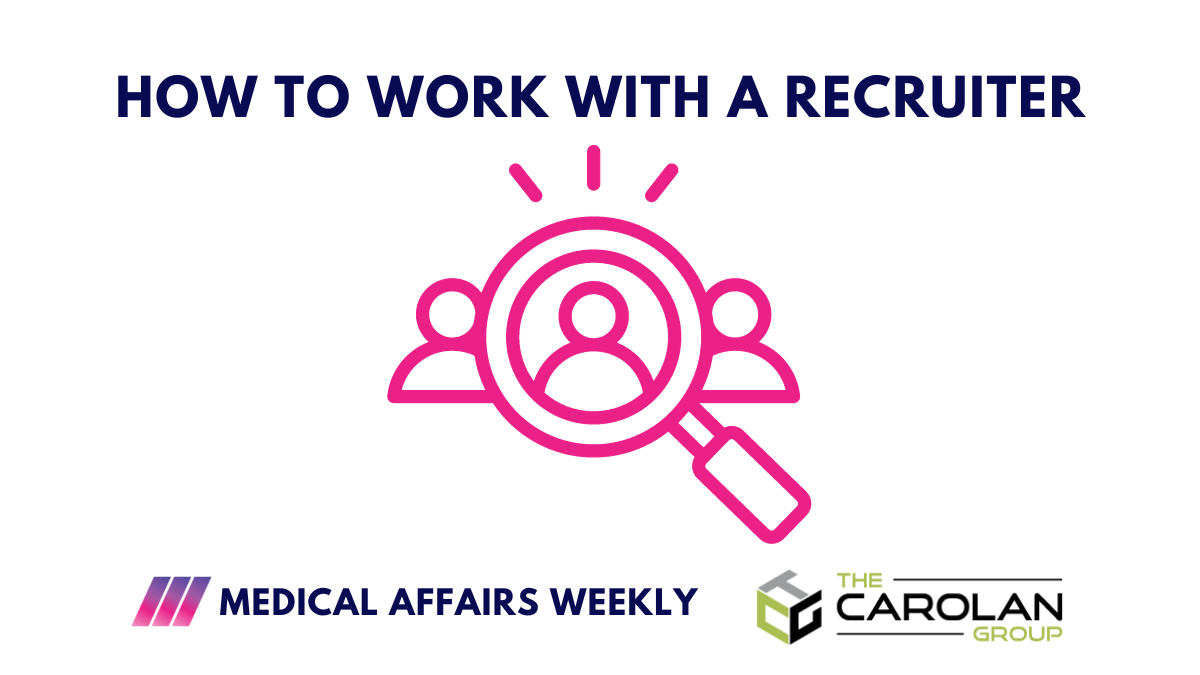- Medical Affairs Weekly
- Posts
- How To Work With A Recruiter
How To Work With A Recruiter
Advice from Sarah Snyder of The Carolan Group
The most popular edition of Medical Affairs Weekly continues to be the first, How to Break into Medical Affairs.
One of the tips I shared was to “Find a Recruiter You Trust.” And I wrote the following:
I don’t have a lot of personal experience with recruiters. However, they have a unique vantage point within the industry and have a good idea of some macro trends impacting medical affairs.
At this point, I won’t point you in a specific direction, but there are a few things to consider when establishing a relationship with a recruiter or agency.
First, try to understand what they specialize in. If you’re trying to land a role as an MSL, that might steer you in one direction, and that might be different if you’re interested in pursuing a career in Regulatory Affairs.
Look for tenure and experience. It strikes me that recruiting is highly dependent on relationships, so I’d be inclined to partner with people committed to Medical Affairs with years of success placing qualified candidates at various companies.
Choose wisely when committing to work with a recruiter. Ensure expectations are clear and follow their process so they advocate on your behalf. Along those lines, make sure you’re fully leveraging them along the way (note that this is very different than exploiting).

I thought now would be a good time to revisit this topic in more detail.
I am a regular listener of Podcasts. One that I listen to regularly is MSL Talk with Tom Caravela.
As I’ve said before, I have limited experience working with recruiters. So, I wanted to go to a trusted source that could provide more insights. Tom and his team at The Carolan Group were top of mind.
Podcasts are a unique medium. While I haven’t worked directly with Tom, I’ve listened to him for hours and can tell he knows his stuff and is well-connected in the Medical Affairs profession.
I reached out to Tom, asking for assistance on this topic. Luckily, Sarah Snyder, PharmD, an Executive Recruiter on his team at The Carolan Group, offered to provide some insights. As someone who has extensive experience in Medical Affairs and is now a recruiter herself, I can’t imagine a better source.
With that, I’ll share her thoughts on working with a medical affairs recruiter…
“Hi, Sarah! Can I withdraw the application I submitted to the company and apply through you instead?”
The short answer to this question is, unfortunately, “No”.
Let’s get into the details about what recruiters in Medical Affairs CAN do for you and why it’s in your best interest to use one when possible. Working with a recruiter is not just a tactic; it’s a partnership propelling your career forward with crucial support and guidance.
The WHAT…
What Exactly is a Recruiter?
A recruiter is a professional intermediary who connects job seekers with employers in the pharmaceutical industry.
We facilitate the hiring process and act as liaisons between candidates and companies.
The WHY…
Why is working with a Recruiter beneficial to you?
We have industry knowledge, access to exclusive job opportunities (jobs that may never be posted), and insights into company cultures.
We streamline the job search process, offer personalized guidance, and can provide valuable feedback to enhance your candidacy.
If you are an aspiring industry professional, we work with you through The Aspire MSL Program - a step by step guide to helping you land your first industry role.
The HOW…
How can you find a Recruiter?
It’s easy to find a Medical Affairs Recruiter on an online platform like LinkedIn. You can also find us at industry networking events. Additionally, you can reach out to colleagues for firsthand recommendations.
If you are an active job seeker, it’s best to develop relationships with a recruiter at each major firm. Although some overlap with the positions they work on, many will have different opportunities and clients of focus.
The EXPECTATIONS…
What can you expect regarding:
Communication:
Expect regular and transparent communication from your recruiter regarding job opportunities, application progress, and feedback from employers. How often you will hear from your recruiter will depend on the job market and the roles available.
Feeling ‘ghosted’:
While ghosting is not the norm, be prepared for occasional delays in communication. If it happens, your recruiter will provide updates and explanations as soon as possible.
Interview Preparation:
You may wish to work with your recruiter on interview preparation. We can offer insights into the company’s expectations, the interview format, and potential questions. We may also provide feedback to enhance your interview performance.
For professionals new to Medical Affairs, courses like The Aspire MSL Program provide you with extra coaching to succeed in job interviews.
Job Offer Negotiation:
A recruiter can guide you through the negotiation process, helping you secure favorable terms while maintaining a positive relationship with the employer. Expect them to provide insights on industry-standard compensation and benefits.
In the competitive Medical Affairs industry, collaborating with a recruiter is more than a convenience—it’s a strategic advantage. We provide exclusive opportunities, streamline your job search, and offer insights into company cultures.
Embrace it, and watch your professional journey flourish.
Before signing off, I wanted to thank Sarah and Tom again for their partnership. If you want to hear more from them, connect on LinkedIn, as they’re very active contributors. Additionally, you can find other resources on their website.
Also, at the time of this writing, they have a Black Friday offer for their Aspire MSL Program. This is not an ad or paid endorsement, but if you want to check out the structured program, now might be a good time!
Until next week,
Tyler
How'd I do with this edition? |
Reply